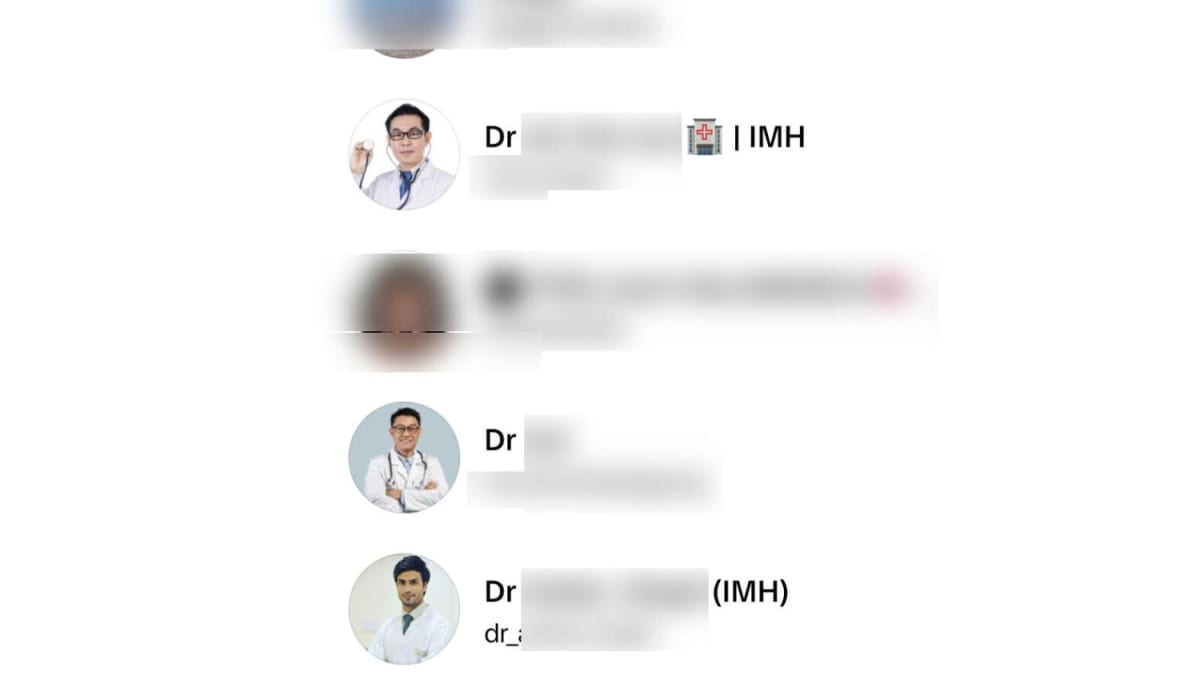
SINGAPORE — At first it was somewhat humorous. Then more accounts and comments popped up, so Ms Cheryl Cheng began to feel uneasy about the negative impact it can have on mental health advocacy in Singapore.
The 25-year-old psychology research assistant at the Nanyang Technological University then signed up for a TikTok account and used it to point out that such comments could perpetuate the stigma on people who need to seek help for mental health conditions at the Institute of Mental Health (IMH).
In the past few months, a growing number of TikTok users have been creating social media accounts to impersonate doctors from IMH. Using both stock pictures and real-life profile pictures of doctors, these users would make comments such as “Did you forget your medicine again?” or “Come see me ASAP (as soon as possible)”.
These comments were often made on TikTok videos featuring people with funny personalities or people who were acting out of the norm.
Some of these account holders making the remarks had names that can be offensive, using vulgar words as their names. One account used an image of a neurosurgeon based in India and created a video claiming to be a real doctor.
In response to queries from TODAY, IMH said that it was aware of this. It added: “These accounts are disrespectful of our doctors, but we are more concerned about the resulting discussions on these accounts that trivialise the challenges of persons living with mental health issues.”
Ms Cheng said: “It’s a humorous trend and not everyone may have the intention of poking fun at people. But it has just gone too far and insinuates that a person is ‘crazy’ and ‘needs to be locked up’.”
When she put up a video to offer her views, it drew mixed opinions, with some impersonators defending their actions by joking that they would “discuss this with their colleagues”.
Mental health advocates told TODAY that even if these users may be making these comments in jest, they can cause more harm than good.
They acknowledged that many young people tend to use dark and self-depreciating humour to cope, but some of these remarks made by the impersonators may not be well-intended.
Dr Jonathan Kuek said that these TikTok users are bringing back a common refrain used in the 1980s and 1990s where people joke about needing to take their medicine so that they can control their symptoms and not go crazy.
IMH said: “Conversations on social media platforms can play a part in improving mental health awareness, but they should be done with sensitivity so as not to further stigmatise mental health issues.”
The psychiatric hospital urged members of the public to not respond to these account holders and to visit IMH’s website and official social media accounts for more information.
So what can be done? Social media platforms ought to step up to regulate such content, the mental health advocates said.
Dr Kuek has reported such accounts for impersonation. However, he has received a long list of rejection messages from TikTok in screenshots seen by TODAY. In them, TikTok states that these accounts “do not violate our community guidelines”.
The advocates also said that this shows the need for more mental health advocacy and digital literacy so that young people know how to navigate such content and better discern what might be considered humorous and what might be offensive.
However, noting that not much could be done to stop a social media trend until it dies down, Mr Low from Limitless said that it could be a good opportunity for IMH and other mental health organisations to grow their presence on TikTok.
“On a more positive note, it opens the doors for these conversations. Like, hey, this is what happens when you really have an appointment at IMH,” he suggested.
WHAT YOUNG SOCIAL MEDIA USERS SAY
Among the youth who spoke to TODAY, some said that they found the exchanges funny, while others said that these trolls have driven the trend into questionable and somewhat offensive territory.
For 23-year-old Sheryln Tan, they can be a joke “if done in good taste”.
This depends on where the comments are made. If they were on the account of a public figure who “has a funny personality and are intentionally funny”, Ms Tan said that she can take it as a joke.
Ms Cheng who had concerns about these said: “Impersonation can be funny in the right context. Like, say, a child does something cute when breaking a rule, and someone pretending to be a discipline master comments.”
Although there were mixed views about Ms Cheng’s TikTok post about the stigma that this trend perpetuates, she said that it was to be expected.
“There’s a sense of anonymity online, so these users feel protected from the consequences of their actions.”
Ms Christel Goh, 32, founder of public relations agency Grow Public Relations, said that with the engagement and “likes” that these comments receive, she noticed that they would often pop up as the first few comments in some TikTok videos.
“I just never thought to report, I just ignore it,” she added.
What caused this trend to grow? Herd mentality and the viral nature of these TikTok videos, some of the young people said.
Likening it to social media users trotting out terms such as “girlypop” and “zesty” when men are effeminate, marketing executive Desmond Lim, 26, said that it has offensive undertones.
“The act of commenting may not cause more harm, but it can perpetuate certain stereotypes and normalise certain behaviours,” he added.
“So it’s like ‘new month, new flavour’ for social media users. Last month, we used certain terms to insult people who are gay, now we insult those who are mentally ill.”
While he admitted that dark humour can be funny, too many people jumping onto the bandwagon can make it “cringe” or unbearable.
Just like other trends, this will die off, he said matter-of-factly.